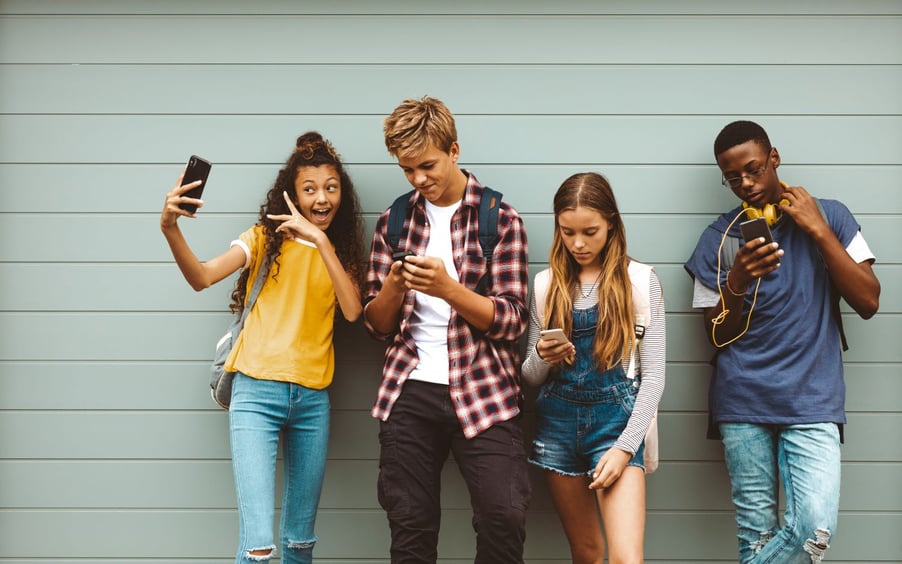The Role of Mindfulness Meditation in Achieving Holistic Health ~ Exploring the Path to Healthier...
Decoding the Influence of Social Media on Your Mental Well-being
Decoding the Influence of Social Media on Your Mental Well-being

In today's digital age, social media platforms like Facebook, Instagram, Twitter, YouTube, and TikTok have become integral to our daily lives, with individuals dedicating an average of 2.3 hours daily to navigating these virtual spaces [1]. These figures point to the undeniable influence of social media on society's fabric, turning Facebook into the most prominent social networking website with a soaring number of over one billion active users [2]. However, as we connect, share, and interact through Instagram, Twitter, LinkedIn, YouTube, and Facebook, it's crucial to understand the profound impact these platforms can have on mental well-being.
The popularity of services such as Discord among the general population underscores a vital discussion around social media, mental health, Instagram, and mental illness, alongside the pros and cons of social media usage [2].
As we delve into the complex relationship between social media and mental health, it's essential to acknowledge both the positive and negative impacts these platforms can have. From the potential to foster community and support to its capacity to contribute to feelings of depression and mental illness, the realm of social media is a double-edged sword [1][2]. Recognizing unhealthy social media habits and cultivating strategies for healthier use is crucial for safeguarding our mental well-being. This article aims to decode the intricate ways social media influences our mental health, offering insights into achieving a balanced and healthy digital lifestyle amidst the ever-evolving landscapes of Facebook, Instagram, YouTube, TikTok, and more [1][2].
The Psychology of Social Media Interaction
Understanding the complex relationship between social media use and psychological well-being reveals a multifaceted landscape of positive and negative effects [3]. Here, we delve into the psychology of social media interaction, focusing on critical aspects that influence mental health:
- Social Capital and Well-being:
-
- Bonding Social Capital: This refers to the benefits we gain from close relationships, such as those with family and friends. Social media can enhance these connections, contributing positively to our mental health by providing emotional support and a sense of belonging [3].
- Bridging Social Capital encompasses the advantages derived from more casual connections, such as acquaintances or friends of friends. Through social media, individuals can access new information, opportunities, and diverse perspectives, indirectly boosting psychological well-being [3].
- The Double-Edged Sword of Social Media Use:
-
- While moderate use can foster social connections and support, excessive social media engagement is linked to lower psychological well-being. The quality of social media interactions plays a crucial role in determining its impact on mental health. Positive interactions can uplift, whereas negative experiences can lead to feelings of inadequacy and distress [1].
- Social media platforms are ingeniously designed to be addictive, leveraging the brain's reward system. The release of dopamine during social media use can create a cycle of addiction, potentially leading to anxiety, depression, and other physical ailments [4].
- Risks and Challenges:
-
- A staggering 69% of adults and 81% of teens in the U.S. use social media, placing a significant portion of the population at risk for mental health challenges. The quest for validation, the fear of missing out (FOMO), and the exposure to unrealistic, filtered images can exacerbate feelings of anxiety, depression, and loneliness [4].
- The impact of social media on mental health is particularly pronounced among teenagers, especially females, with early social media use being linked to greater mental health issues. Adults are not immune, with some seeking plastic surgery to resemble their filtered online personas [4].
Exploring the psychology behind social media interaction reveals that while social media has the potential to enrich our lives through enhanced connectivity and support, it also poses significant risks to mental well-being. Recognizing and addressing these challenges is vital for fostering a healthier, more balanced relationship with digital platforms.
Get your copy of Dr. Rick Wallace's 28th book, Healed and Whole!

Positive Impacts of Social Media on Mental Health
In exploring the myriad ways social media impacts our mental health, it's pivotal to highlight its positive influences. These platforms, when navigated judiciously, can bolster our mental well-being through various channels:
- Enhanced Connections and Community Support:
-
- Routine engagement on platforms like Facebook, Instagram, and Twitter is linked with increased social well-being, positive mental health, and improved self-perception of health [6].
- A significant aspect of social media is its ability to foster community. For instance, seven out of ten adolescent girls of color have found content that positively affirms their racial identity, showcasing social media's role in promoting inclusivity and understanding [8].
- The sense of belonging is further amplified as most adolescents report that social media platforms help them feel more accepted, supported through challenging times, and connected to their peers' lives [8].
- Emotional Support and Decreased Stigmatization:
-
- Online communities serve as a pivotal space for individuals to discuss health conditions, adverse life events, or day-to-day challenges, thereby reducing feelings of stigma and enhancing emotional support [1].
- Active interaction, including sharing messages and reminiscing about past experiences, is directly associated with improved well-being, highlighting social media's therapeutic potential [7].
- Stress Reduction and Mental Health Interventions:
-
- Humor, rewarding social interactions, and mutual friendships on social media have been identified as stress reducers, especially noted during the COVID-19 pandemic [1].
- For children and adolescents, social media and other digital platforms may serve as critical avenues for initiating mental health care and promoting help-seeking behaviors, underscoring the potential of these platforms as tools for psychological intervention [8].
These facets of social media use underscore the potential benefits that can be harnessed to enhance mental health and overall well-being. Users can cultivate a healthier, more positive relationship with social media by focusing on the constructive aspects and leveraging these platforms for support, connection, and intervention.
Negative Impacts of Social Media on Mental Health
In our journey to understand the multifaceted impact of social media on mental health, we must confront the darker facets that challenge our well-being. The negative repercussions of social media are profound and varied, affecting individuals across different aspects of their lives:
- Body Image and Self-Esteem:
-
- Social media platforms often portray unrealistic standards of beauty and success, leading to body image dissatisfaction and a significant impact on self-esteem [1].
- Comparisons with others on social media can intensify feelings of inadequacy, jealousy, and low self-esteem, fostering a cycle of negative self-perception [5][11].
- Addiction and Cyberbullying:
-
- The addictive nature of social media can ensnare users in a cycle of compulsive usage, detracting from real-life interactions and leading to cyberbullying involvement, which has been linked to depression among children and adolescents [1][9][12].
- Adolescents, in particular, face a higher risk of experiencing cyberbullying, with adolescent females and sexual minority youth more likely to report such incidents, underscoring the need for vigilance and supportive interventions [9].
- Social Media and Mental Health Risks:
-
- Excessive use of social media has been associated with increased loneliness, fear of missing out (FOMO), and a decline in subjective well-being and life satisfaction [1].
- The phenomenon of FOMO can exacerbate feelings of exclusion, leading to anxiety and depression, particularly when users perceive themselves as missing out on activities or experiences [4].
- Signs of screen fatigue and digital burnout, including spending excessive time on devices and feeling stressed by social media feeds, signal the need for a balanced approach to digital consumption to mitigate symptoms of anxiety and depression [4].
Understanding these challenges is pivotal in pursuing a healthier, more balanced relationship with social media. By acknowledging the potential negative impacts, we empower ourselves to take proactive steps towards cultivating a digital environment that supports, rather than undermines, our mental well-being.
Identifying Unhealthy Social Media Habits
Recognizing signs of unhealthy social media habits is the first step toward reclaiming control over one's mental and emotional well-being. Engaging in mindless scrolling for extended periods, constantly seeking validation through likes and comments, and experiencing distress when unable to access social media are all red flags indicating a problematic relationship with these platforms. By cultivating self-awareness and setting boundaries, individuals can mitigate the negative impact of social media on their mental health. Establishing designated screen-free times, limiting daily usage, and curating a positive and diverse online environment are effective strategies for promoting a healthier digital lifestyle. Ultimately, prioritizing genuine connections and self-care over virtual validation is essential for nurturing a balanced and resilient mind in today's interconnected world.
Here are some signs that may indicate the need for a reevaluation of our social media use:
Signs of Potential Unhealthy Social Media Habits
- Compulsive Behaviors:
- Social Media's Impact on Mood:
- Risky Social Media Practices:
Strategies for Parents and Individuals
For parents aiming to guide their children towards healthier social media use, several strategies can be effective:
- Monitoring and Limiting Use: Monitor the time spent on social media and enforce breaks [5].
- Educational Conversations: Discuss the potential impacts of social media and remind students that it does not accurately reflect people’s lives [5].
- Encourage Offline Activities: To provide a balance and promote exercise and interests that do not involve screen time [5].
For individuals, recognizing these signs and taking proactive steps to adjust social media habits can lead to improved mental health and overall well-being.
Strategies for Healthier Social Media Use
To cultivate a healthier relationship with social media and enhance our mental well-being, we can adopt several strategic approaches that empower us to use these platforms beneficially:
1. Social Media Literacy and Mindful Engagement:
- Educate on Social Media Literacy: Understanding the dynamics of social media can lead to more balanced and meaningful online experiences. This includes recognizing the addictive nature of these platforms and learning how to navigate them thoughtfully [1][20].
- Monitor Emotional Responses: Before and after using social media, take a moment to assess how you feel. This practice can help identify patterns that may indicate whether your social media habits benefit or harm your mental health [4].
2. Personal Usage Strategies:
- Set Time Limits: Use tools like Screen Time or Google Wellbeing to limit your daily social media use. This helps prevent overuse and negative feelings, such as regret and frustration [20].
- Curate Your Feed: Actively choose to follow accounts that inspire and uplift you, and unfollow or mute those that trigger negative emotions. This simple action can significantly improve your social media experience [17].
- Engage Meaningfully: Focus on using social media for genuine connection by participating in meaningful conversations and supporting others. This can enhance your sense of community and belonging online [17].
3. Digital Detox and Real-Life Connections:
- Take Regular Breaks: Decaying away from social media can clear your mind and reduce dependency. Consider a digital detox, where you abstain from social media for a set period to reconnect with the world around you [17][21].
- Prioritize In-Person Interactions: Healthy alternatives to technology use include scheduling in-person coffee dates, phone conversations, or starting a new hobby. These activities can fulfill the human need for connection in more profound and satisfying ways [10].
- Create No-Phone Zones: Establish specific areas or times of day where digital devices are not allowed, such as during meals or before bedtime. This can help encourage more face-to-face interactions and ensure a good night's sleep [10].
By integrating these strategies into our daily lives, we can navigate the complex landscape of social media with greater awareness and control. These practices safeguard our mental health and enrich our online and offline experiences, fostering a balanced and fulfilling digital life.
The Role of Digital Detox in Mental Well-being
In recognizing the pivotal role of digital detox in bolstering our mental well-being, we uncover several compelling benefits that underscore its importance. Here’s a closer look at the transformative impact of stepping away from digital devices and social media:
- Stress Reduction: The omnipresence of digital connectivity often escalates our stress levels. A digital detox can significantly alleviate this stress, offering a much-needed respite from the constant barrage of notifications and digital demands [23].
- Enhanced Sleep Quality: Screens emit blue light, disrupting our natural sleep patterns and leading to poorer sleep quality. By committing to a digital detox, especially in the hours before bedtime, we can improve the quality and quantity of our sleep, contributing to better overall health [23].
- Elevated Well-being: Limiting our engagement with social media has been directly linked to reduced symptoms of depression and loneliness. This suggests a digital detox can enhance mental and emotional well-being [23].
Furthermore, the benefits extend into various aspects of our lives, creating a ripple effect that fosters a more balanced and fulfilling existence:
- Establishing Work-Life Balance: In today’s world, the lines between work and personal life are increasingly blurred, thanks to technology. A digital detox helps delineate these boundaries more clearly, reducing job stress and enhancing job satisfaction by ensuring that work does not encroach upon personal time [23].
- Minimizing Social Comparison: Social media platforms are rife with curated images that often depict an idealized version of reality. This constant exposure can lead to detrimental social comparisons, fostering feelings of inadequacy. A digital detox offers a break from these comparisons, allowing us to reconnect with our intrinsic worth and reduce the impact of such comparisons on our self-esteem [23].
- Decreasing FOMO: The Fear of Missing Out, or FOMO, is amplified by our digital connections, as we are constantly bombarded with updates on others’ lives and experiences. Taking a step back from social media through a digital detox can help mitigate these feelings, grounding us in our present reality and reducing the anxiety associated with missing out [23].
A digital detox is not merely a break from technology; it’s a deliberate choice to reclaim our time, focus, and mental space. By consciously deciding to disconnect, we empower ourselves to reconnect with the world around us, our loved ones, and, most importantly, with ourselves. As a 2018 University of Pennsylvania study suggested, this practice can profoundly alter our perception of social media, decreasing feelings of loneliness and depression and paving the way for a more balanced and fulfilling digital life [4][22].
Conclusion
Throughout our exploration of the intricate relationship between social media and our mental well-being, we have observed how these digital platforms can serve as both a source of support and a potential pitfall. The key to leveraging the positive while mitigating the negative impacts lies in mindful engagement, recognizing unhealthy habits, and fostering strategies for healthier use. Notably, the concept of a digital detox stands out as a powerful tool in reestablishing a balanced approach to our digital lives, underscoring the necessity to occasionally disconnect to reconnect with what truly matters.
The journey towards a healthier relationship with social media does not have to be navigated alone. For those seeking personalized guidance, working directly with Dr. Rick Wallace on a 1-on-1 basis offers a tailored approach to mastering this balance. This partnership can empower individuals to cultivate a digital environment that nurtures rather than depletes mental well-being. Ultimately, by embracing a balanced and informed approach to social media use, we can harmonize our online presence with our quest for mental and emotional health, paving the way for a more fulfilling digital and real-world existence.
For additional resources and information, Visit here!
FAQs
1. What impact does social media have on mental health?
Social media can have a significant effect on mental health. It has the potential to foster connections, boost self-esteem, and enhance feelings of community. However, it can also cause substantial stress, encourage unhealthy comparisons with others, and lead to increased feelings of loneliness and sadness. Therefore, it's crucial to engage with social media mindfully.
2. Can social media usage contribute to depression and anxiety?
Yes, frequent use of social media can heighten the fear of missing out (FOMO) and feelings of inadequacy, dissatisfaction, and isolation. These emotions can negatively influence your mood and exacerbate symptoms of depression, anxiety, and stress.
3. How does social media raise awareness about mental health issues?
Social media can positively impact mental health care by being a valuable source of information and offering access to helpful resources, advice, and specialized professionals. Additionally, it allows individuals to join online groups or communities, providing a sense of belonging, emotional support, and the opportunity to connect with others facing similar challenges.
4. What is the relationship between social media and social anxiety?
There is a notable connection between social anxiety disorder and social media, primarily due to the reduced face-to-face interactions. Social media provides a level of comfort for individuals with social anxiety, as they can interact with others behind a screen. However, this might impede their ability to engage with people in real-life situations.
References
[1] - https://bmcpsychology.biomedcentral.com/articles/10.1186/s40359-023-01243-x
[2] - https://www.ncbi.nlm.nih.gov/pmc/articles/PMC4183915/
[3] - https://www.ncbi.nlm.nih.gov/pmc/articles/PMC8255677/
[4] - https://www.mcleanhospital.org/essential/it-or-not-social-medias-affecting-your-mental-health
[5] - https://www.helpguide.org/articles/mental-health/social-media-and-mental-health.htm
[6] - https://www.hsph.harvard.edu/news/features/social-media-positive-mental-health/
[7] - https://paintedbrain.org/editorial/7-ways-social-media-can-benefit-mental-health-2
[8] - https://www.ncbi.nlm.nih.gov/books/NBK594763/
[9] - https://www.hhs.gov/sites/default/files/sg-youth-mental-health-social-media-advisory.pdf
[10] - https://www.nebraskamed.com/behavioral-health/digital-detox-take-a-break-from-technology-to-boost-mental-health
[11] - https://www.makeuseof.com/signs-of-unhealthy-social-media-usage/
[12] - https://www.linkedin.com/pulse/5-social-media-bad-habits-avoid-all-costs-waqas-qureshi
[13] - https://www.yalemedicine.org/news/social-media-teen-mental-health-a-parents-guide
[14] - https://www.waldenu.edu/online-masters-programs/ms-in-psychology/resource/signs-of-unhealthy-social-media-habits-mental-health-practitioners-should-spot
[15] - https://www.lispine.com/blog/11-signs-that-your-social-media-habits-are-unhealthy/
[16] - https://sova.pitt.edu/how-can-you-tell-if-your-social-media-habits-are-toxic-2/
[17] - https://www.mercycare.org/bhs/employee-assistance-program/eapforemployers/resources/6-tips-for-healthy-social-media-use/
[18] - https://www.commonwealthcarealliance.org/living-well-at-home/7-healthy-habits-for-social-media-use/
[19] - https://news.mit.edu/2020/mindhandheart-nine-tips-healthy-social-media-use-0123
[20] - https://red.msudenver.edu/2023/9-ways-to-have-a-healthier-social-media-presence/
[21] - https://www.onemedical.com/blog/healthy-living/healthy-social-media-habits/
[22] - https://www.lifespan.org/lifespan-living/what-digital-detox-and-do-you-need-one
[23] - https://www.verywellmind.com/why-and-how-to-do-a-digital-detox-4771321




